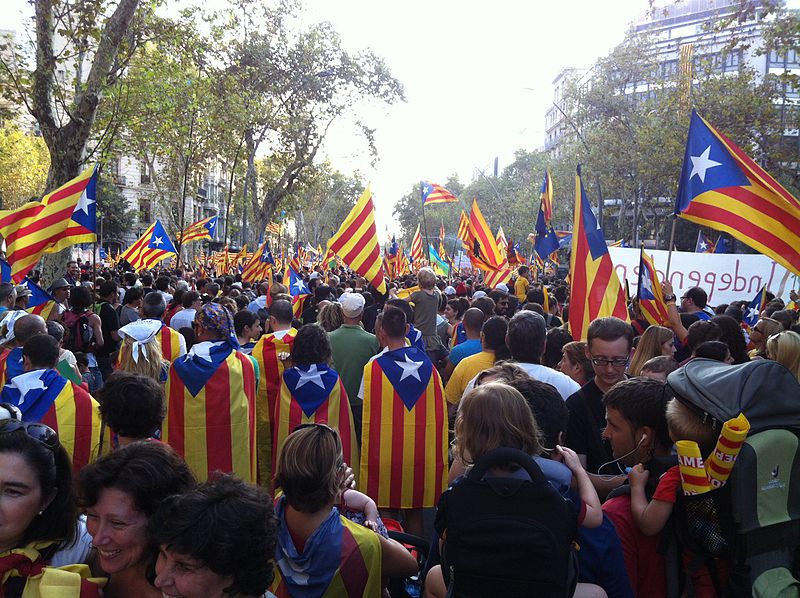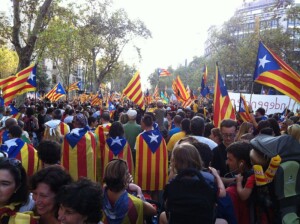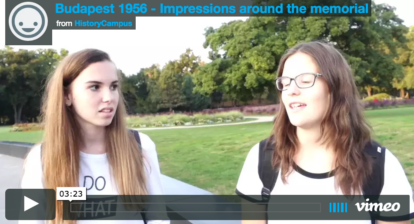People being beaten up by the police just for trying to vote, a government which declares a referendum binding even though parts of the electorate where not able to vote and a large number of ballots where confiscated, and finally nearly the whole democratic elected government either in prison or in exile – the events around the Catalan independence referendum where unexpected and incomparable to any political development the old EU member states experienced since the end of the dictatorships in the South. Camilla Crovella from Italy tries to find explanations for these developments and looks also for future solutions by asking students both from Catalonia and Spain about their views and opinions.
The Catalan Point of view
Joaquim Candel (22), Economics student from Barcelona and active member of the Catalan Movement for Independence and Nil Redón Orriols (19), Maths student from Barcelona, present their different opinions about the topic.
The topic of Catalonia’s call for independence is not new in contemporary Spain. What was your opinion about this topic before the events of the last month? What do you think has changed now?
Joaquim: The judgement of the Spanish Constitutional Court from 2010 was without doubt a point of inflection. It declared the invalidity of several parts of the Catalonian Statute of Autonomy, including the article that defined Catalonia as a nation. Since then, a sentiment for independence has increased. The current referendum is nothing new. There have been two attempts in the last two years. What is different now is that the Catalan Government announced that the result would be binding.
Nil: I have always been neutral on this topic, as I thought that both parts had their right. Currently, I still think the same. But neither the Catalan nor the Spanish Government have taken the right decisions to solve the conflict in the past. They have always remained inflexible in their position until they came to the open-field hit.
Joaquim: “Catalonia was independent before Spain was reunited”.
Differences Between Catalonia and Europe
Do you see cultural, social or economic differences between Catalonia and the rest of Spain? If so, could you give some examples of it based on your personal experience?
Joaquim: To start with, Catalonia was an independent country before Spain was reunited. It has always had a distinct language, its own culture and identity. In the last centuries, it has positioned itself as one of the most economically developed regions in Spain and main exports region. Nevertheless, Catalonians have always felt mistreated by the Spanish Government when it comes to redistributing wealth. This year, we have been the 4th region in terms of contribution to GDP per capita and the 14th in terms of expenditure. Also, we suffer from the highest university fees, have the poorest motorway net, the highest public debt. Even key infrastructures, promised by the Spanish Government, such as the North Sea-Mediterranean Corridor, have not been completed. This is creating a huge sentiment of unfairness. Many think Catalonia would be much better off if it could administrate its own resources and spend its taxes.
Nil: Obviously, there are differences. In Catalonia, we have our own language, although it coexists perfectly with Castilian. Economically, we are one of the most prosperous areas of Spain and socially, we have our own traditions and national celebrations. I believe that after all each Spanish region has its peculiarities, and it depends on each person to decide whether those existing differences are strong enough to consider us as a different nation from Spain, or if on the contrary the similarities with the rest of Spaniards are stronger.
How do Catalans Identify?
The Referendum is neither foreseen by the Spanish constitution, nor authorized by the Spanish Government. What do you think about Rajoy’s Government’s decision to coercively forbid the access to polling stations? Do you think the Government could have claimed its sovereignty on the Catalan territory in a different way? Why/Why not?
Joaquim: I think this can be questioned. Article 92 of the Spanish Constitution clearly states that the King can call upon a referendum on political decisions of vital importance. Many Constitutionalists and even the Constitution’s authors have repeatedly stated that a referendum on the independence of Catalonia would be perfectly legal. It is not a legal problem, it is a political problem. The brutal use of force was planned (10.000 police officers in addition to those normally assigned to Catalonia were sent by the Spanish Government).
“It was Cleat that the Referendum was Illegal”
More than 10.000 citizens were wounded. One of them was my 76 year old grandfather, who was hit just because he was bringing food for the volunteers at the polling stations. National and international media recorded videos from the aggression and it is difficult to affirm that the use of force was proportionate. In my opinion, this shows that Spain can only control Catalonia through the use of force. The Spanish Government could have instead start a negotiation with the Catalan people by making a proposal on the future of Catalonia.
Nil: The decision to attack the citizens in the way the Spanish Government did seems to me regrettable and very inappropriate for any government. It was clear that the referendum was illegal (also because the Spanish Government made no effort to negotiate), so they could have just let it happen and then declare it invalid, and they would have been right. But by acting as they did, many neutral Catalonians turned against the central Government. They do not feel represented by a government that attacks them in this way.
Views on Voting
Did you decide to vote? Why/Why not?
Joaquim: I voted, because after 40 years of dictatorship, it is my duty to exercise my rights. Even if I would have not supported the independence, as I do, I would have voted, because it is my right to do so.
Nil: I decided not to vote. The days before the referendum I convinced myself to vote, since the Spanish Government wanted to prevent us from expressing our opinion. I did not agree with that and I did not want the Government to achieve its purpose. But when the day came, my mind was not clear, and I thought that such an important issue should not be decided in those circumstances. The events of the previous days pushed me to vote YES, but I thought I needed to reflect more on that decision. In addition, the Guardia Civil carried out a disproportionate violence in the center where I should have voted. I decided not to vote, partially because of my unclear mind about what to vote and partially to avoid the riots.
First reactions to the Referendum
What was your feeling on the Referendum day? What was your reaction after the result was announced?
Joaquim: I woke up very late and was astonished by the brutality of the images and videos I watched on TV and in different WhatsApp groups. Despite the fear and risk of being attacked, I voted and stayed in the electoral voting points to avoid a potential entrance of the police forces. Fortunately, they did not come. I was very happy about the final result. Nevertheless, I was frustrated about the fact that 600.000 votes were removed by the Spanish police and could not be added into the official count of 2.1 million.
Nil: I felt very sad and angry, seeing that the forces that should defend us (National Police and Civil Guard) held violence against us. This because our politicians were not able to reach an agreement to make a legal referendum. It was very clear that the result would be YES, since the people who supported NO did not go to vote. I was not surprised by the result.
Nil: “The best possible solution would be new elections in Catalonia and in Spain.”
The Current Situation
What is your opinion about the situation right now? What would be in your opinion the best solution?
Joaquim: Currently, eight Catalan Ministers are in prison and the President together with the remaining three Ministers are in exile (in Belgium. The Belgian Public Prosecutor claimed for Puigdemont’s and the other Ministers’ arrest. The judgement is expected on 4 December. Further information here, ed). In addition, the Spanish Government is forcing an election in one month with the rivals in prison, something that is unimaginable in any democracy. The main leaders of the Catalan Civil Society are also in prison. The only solution is a European intervention, to release all political prisoners and monitor a binding referendum on independence.
Nil: The current situation has no solution. We need to start over. To me, the best possible solution would be to call elections for new governments, both in Catalonia and in Spain. Then, to make a legal referendum to allow everyone to expresses his or her opinion freely. In such case, if the majority wants the independence, then that decision must be obeyed. Both governments should start working on that purpose, until achieving a peaceful and advantageous, although difficult, separation for both parties. If instead, the majority will express against it, Catalonia should remain part of Spain. Unfortunately, I do not think this is possible, because I see little willingness to change positions on both sides.
The Spanish Point of View: A Problem for Spain and for Europe
Elena Sokolwski Barron (21), Veterinary student from Seville and Isabel Martínez Jiménez (21), Journalism and Communication student from Seville, present their point of view as Spaniards on the Catalan issue.
The topic of Catalonia’s call for independence is not new in contemporary Spain. What was your opinion about this topic before the events of the last month? What do you think has changed now?
Elena: Honestly, this topic has always existed along Spanish history. The Spanish government has always invested many resources in Catalonia, trying to silence them, but it never worked. What happened last month in the region is an extreme radicalisation, confusion and desperation. Radicalization, due to a violent aggression from the Catalans standing for the independence to those who are not. Spanish flags and King’s pictures were burnt, speeches were held from the regional Government against the Spanish nation and so on. Confusion, because for the rest of Spain has been quite difficult to deduce what was going on. The process from an ideological conflict to a material one has soared too fast. Finally, desperation, considering that this independent movement wants to achieve its goal irreversibly, with no more space for compromise.

Elena Sokolwski (21) understands Catalonia’s requirements but believes in the impossibility of an indipendent Catalonia.
Isabel: I thought that Catalonia could be a relevant problem for Spain if the two Governments would not start a dialogue. Now, I think Catalonia is a real problem, not only for Spanish people, but also for Europe. Before last month, I compared Catalonia to other regions that want more independence from the central State. However, it is a fact that since a few years ago, Catalonia has become one of the most important issues to deal with for the Spanish Government.
Differences Between Catalonia and Europe
Do you see cultural, social or economic differences between Catalonia and the rest of Spain? If so, could you give some examples of it based on your personal experience?
Elena: Yes. That’s part of Spanish diversity. The most evident difference is the language (they usually speak Catalonian instead of Spanish). It happened to me a few times: I asked something in Spanish and received the answer in Catalonian.
Isabel: It is obvious that there are differences between Catalonia and the rest of Spain due to the historical past events. When Francisco Franco proclaimed the dictatorship in 1939, the autonomy of Catalonia was suspended. Catalan people couldn’t speak their language either. When Franco died, autonomy was re-established: the current Statute of Autonomy of Catalonia was approved in 1979. Since then, the feeling of nationalism has grown in Catalonia until today. Economic differences are also important. Catalonia’s economy is the strongest in Spain. However, the Spanish Government has invested many resources in Catalonia (along with Andalusia). In my opinion, Catalonia gives a lot to the central Government in economic terms, but also receives investments in return.
How do Catalans Identify?
Would you say, as a Spaniard, that Catalans cannot identify themselves in the Spanish State? Why/Why not?
Elena: Catalonia is now divided. I think the vast majority of the Catalan people feels both Catalan and Spanish. I suppose these people consider their double identity as a part of themselves as Spaniards and of the Spanish history. The pro-independence Catalonians consider themselves as completely different from the rest of the Spaniards and think Spain has stolen their identity. This is somehow understandable, as Catalan people usually grow up speaking a different language and practicing their own customs.
Isabel: Catalonia is a region like any other, so if other regions can feel they are part of Spain, why not Catalonia? It is a matter of coexistence: united in diversity. It is true that they have their own customs, but Spanish traditions are also Catalan traditions.
“Each part has its share of responsibility” or “It was morally incorrect not to allow the Catalonians to vote – but Spanish Government has to enforce the law”.
First reactions to the Referendum
How did you react when the referendum was first announced? What was your first prevision on the consequences of this announcement?
Elena: I thought the Catalan Government was just re-proposing the same complains over again and that they would have stopped soon, as already happened in the past years.
Isabel: When the referendum was first announced I felt surprised. I thought that the events were being precipitated by the pro-independence forces. However, my expectations were not good, considering the background of this topic. Firstly, the referendum was illegal. Despite this, it is true that the Catalan Government had requested a referendum in several occasions. The central Government always declined the request. Therefore, indifference has been the greatest ally of this whole issue; but forcing a referendum could not have a good ending. At this point, we can say that each part has its share of responsibility.
Inhumane and Morally Incorrect Moves
The Referendum is neither foreseen by the Spanish constitution, nor authorized by the Spanish Government. What do you think about Rajoy’s Government’s decision to coercively forbid the access to polls? Do you think the Government could have claimed its sovereignty on the Catalan territory in a different way? Why/Why not?
Elena: I think it was inhumane and morally incorrect not to allow the Catalonians to vote. On the other hand, even if I don’t agree with the police’s violent attitude, I also think it is a duty of the Spanish Government to make the Law be respected on its territory.
Isabel: Nowadays, democracy is hurt in Spain. People should vote without violence, always in a legal way. I think the police’s intervention was wrong. I also know that they didn´t find any other fast solution to stop the referendum (and the Catalan Government was not willing to back down), but the action of the police wasn’t the most appropriate. I think that, if the Spanish Government had allowed this referendum and declared it illegal (and therefore invalid), the process would have been easier.
What is your opinion about the situation right now? What would be in your opinion the best solution?
Elena: Right now the situation is quite confusing. Puigdemont has left the country, like if he escaped from the monster he created himself. I think this demonstrates that a real independence for Catalonia is inconceivable.
Isabel: On one hand, I think both Governments must be renewed; it is necessary to call for new elections. On the other hand, it would be convenient to focus on the advantages and disadvantages of Catalonia’s separation from Spain. In this way, Catalonians could re-consider their ideas about the benefits of a future separation.










Pingback: 5 Years After The Catalan Referendum - EUSTORY History Campus